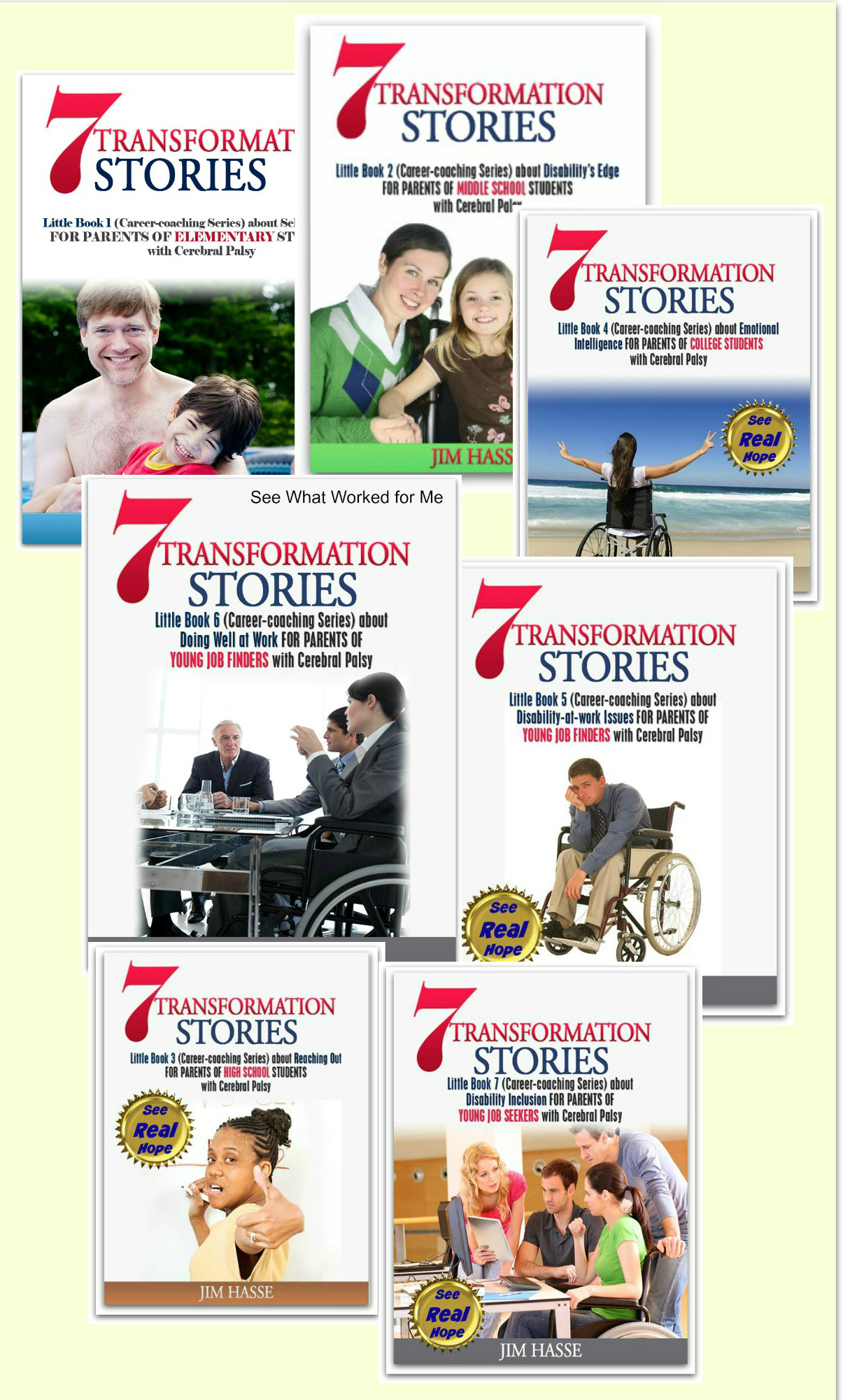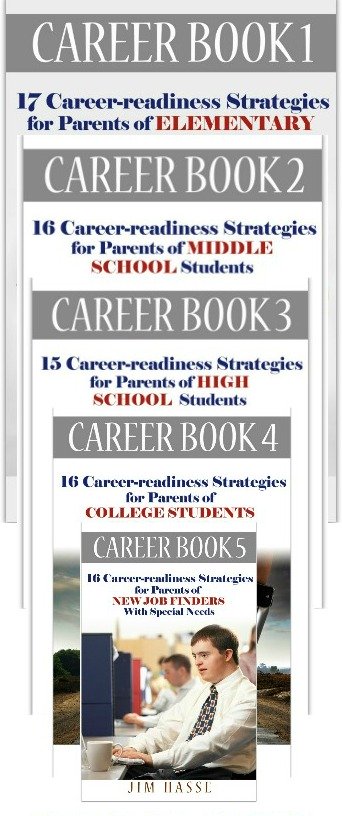Career Development Plan: Guidelines for Elementary Students with Cerebral Palsy
By Jim Hasse, ABC, GCDF, Disability Employment Expert
_________________________________________________________
A career development plan for your elementary student with cerebral palsy (CP) needs to be truly “developmental."
Just like math, it’s difficult to learn more advanced concepts if your youngster has not yet mastered the foundation skills. He or she needs to engage in appropriate formal and informal career development activities to build his or her career management skills.
In doing so, your youngster grows in in self-knowledge, knowledge about work and education and skills in decision-making and planning. Careers, after all, are built over a lifetime, and your youngster’s career development plan will change many times over the years from elementary school through adulthood.
Four stages of career development
According to the Oregon Department of Education, the stages of a career development plan are most often associated with age. During the elementary grades, your youngster is likely to be involved in the Awareness stage; in middle school, the Exploration stage; in high School, college and early adulthood, the Planning and Preparation stages; and the Establishment and Transition stages throughout his or her adult life.
In
the light of your child’s
current stage of career development,
what support does he or she need right now?
Join
PACER’s Facebook
discussion.
Also see "Moms and Dads Who Have Kids with Cerebral Palsy" discussion.
Your youngster’s career development plan also depends on his
or her "career maturity" and circumstances which may be affected by
disability.
Career maturity relates to an individual‘s readiness to perform career-related tasks. To perform tasks, a person needs a positive attitude, skills, and knowledge.
You probably have known adults who are advanced in their work lives but are suddenly thrust into unemployment. Even though they have worked for many years, they may not be prepared for a career change.
Without adequate self-knowledge and knowledge of the world of work, they find it difficult to make informed career decisions. They may need to return to the activities associated with the Exploration stage to build the skills they need to make a successful career transition.
It is important to understand that your youngster will progress through the career development process at his or her own pace. At some point, the stages may even overlap. Or your youngster may go back to an earlier stage. If you can recognize your youngster’s stage of career development, you will know how to better provide needed support.
Schools engage students in classroom career activities. Because they are working with a group of students, the activities are generally designed to address specific developmental stage. This assumes all students are at that same stage; and this most likely is not the case.
So, if your youngster is struggling with an assigned career-related task, consider if he or she has the skills and knowledge to complete the task.
As your youngster moves through school, you will become increasingly involved in his or her career development plan. After high school, your involvement will likely decrease, but your continued support is just as vital. Even with the best planning, it is not unusual for children to be indecisive about their careers well into their 20's.
And, just as with anything else in life, there are no guarantees. The most carefully shaped career development plan will not prevent mistakes, unforeseen events, or unusual circumstances beyond your control.
However, by helping your youngster acquire career skills and gain self-confidence in “I can do this,” you’re helping him or her move forward.

Career awareness
The lifelong process of career development begins as early as four years old. In these early years, you can begin to instill hope and confidence about the future by helping your youngster discover the world and how he or she will be able to best navigate in it as an independent adult.
This awareness stage involves discovery, imagination, and curiosity. Your youngster is fascinated by everyday things. He or she wants to know more about the things happening in the family, the community and the world.
Your youngster may have a career fantasy that is totally unrealistic. That’s OK. When I was about six, I was convinced that I wanted to be a carpenter, a builder, because I saw most of the men in life on our farm with a hammer or some sort of tool hanging out of their bibbed overalls, and I thought hammers were so cool.
To this day, I remember my grandmother scoffing at my idea. Of course, it was unrealistic. But, I enjoyed imitating my adult world.
As a career-coaching parent or mentor, you play a vital
role in encouraging your youngster to explore various careers through play and
dress up, reading and talking, exploring and learning – even though they’re
“fantasy careers.”
Why is it important to start early?
It is never too early to begin talking to your youngster about personal gifts, talents and interests. Your youngster will do better in school if he or she believes personal success is obtainable.
At the elementary level, a career development plan usually revolves around career-related activities which often focus on:
- Self-awareness.
- Development of a positive attitude about learning and doing.
- Development of skills to make decisions.
- Knowledge of the broad characteristics and expectations of
work.
What should your elementary student be able to do?
Here are 10 important career skills your youngster can develop while in elementary school:
- Identify interests,
likes, and dislikes.
- Describe strengths
and talents.
- Demonstrate
positive behaviors and personal characteristics such as honesty, dependability,
responsibility, integrity, and loyalty.
- Recognize that one
should accept responsibility for one's behavior.
- Interact with
others in a fair, helpful, and respectful way.
- Recognize that
people have many life roles and that these need to be balanced.
- Demonstrate study
skills and good learning habits.
- Be able to set
goals and work toward achieving them.
- Describe different
ways to make decisions.
- Recognize a variety of skills that are important for success in school and work, such as communicating, critical thinking, problem solving, and interpersonal skills.
These skills cover some of the most important indicators included in the National Career Development Guidelines (NCDG) for the awareness developmental stage in a career development plan.
The guidelines describe what children and adults should understand and be able to do at various stages of their career development. They include specific goals and learning indicators grouped by the three principle domains:
- Personal and Social Development.
- Educational Achievement and Lifelong Learning.
- Career Management.
This
framework for a career development plan may help you think about the types of
activities you do or can do to help with your youngster’s career awareness
during elementary school years.
In
the light of your child’s
current stage of career development,
what support does he or she need right now?
Join
PACER’s Facebook
discussion.
Also see "Moms and Dads Who Have Kids with Cerebral Palsy" discussion.
Return
from Career Development Plan to Job Titles
Go to Cerebral Palsy Career Builders
This is Creative Commons content. You can freely and legally use, share and repurpose it for non-commercial purposes only, provided you attach this sentence and the following attribution to it (including the two links):
Originally written and illustrated by Jim Hasse, ABC, GCDF, owner of Hasse Communication Counseling, LLC, who, as a person with cerebral palsy, served for 10 years as a vice president in a Fortune 500 company during his 29-year career in corporate communication. He’s an Accredited Business Communicator, certified as a Global Career Development Facilitator and author of 14 Amazon books about disability awareness and disability employment issues.





